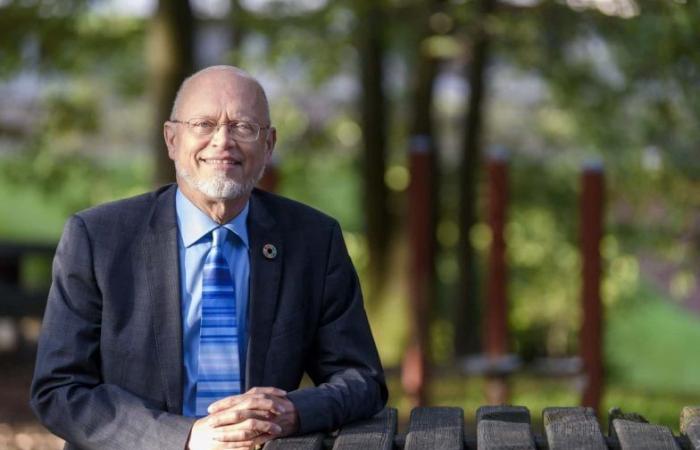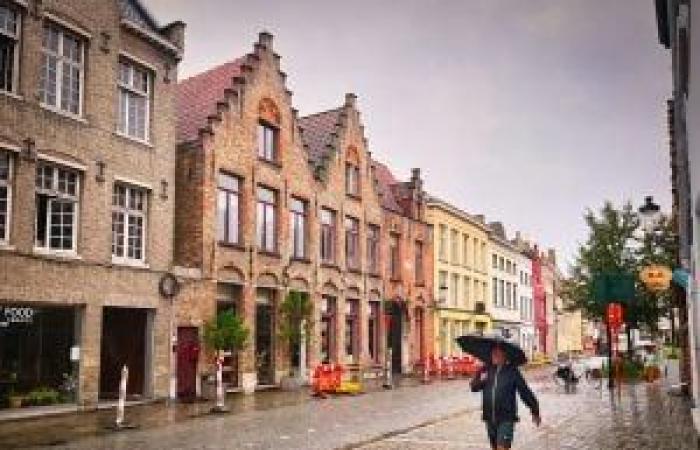Throughout the world, the effects of climate change were particularly felt in 2024, after an already record year in 2023. Belgium is not immune to global warming, with hottest and wettest year on record in 2024 since the existence of weather services in 1853.
According to the Royal Meteorological Institute (IRM), the Uccle station recorded between January 1 and December 19 1146.2 mm of precipitation (i.e. 1.14 meters), an absolute record. There were no more rainy days (203) than in previous years, but it rained much harder.
December 2024 was also marked by unusual sweetness and extremely little sunshine in Brussels, with only 17 hours of sunshine compared to a normal of 48.5 hours, according to the IRM.
The European Copernicus Observatory and the World Meteorological Organization (WMO) confirmed on January 10 that 2024 was the year hottest recorded with global warming exceeding 1.5 degrees since the start of the industrial era.
Belgian climatologist Jean-Pascal van Ypersele*, professor at UCLouvain and ULiège, founder of the Walloon Platform for the Intergovernmental Panel on Climate Change (IPCC) and former Vice-President of the IPCC, responded to the UNRIC questions.
In your opinion, will climate change be particularly felt in Belgium in 2024, compared to previous years? Is this exceptional, to the extent that Copernicus and the UN indicate that Europe is the continent which is warming the fastest?
In 2024, Belgium experienced marked climatic events: total amount of precipitation 40% higher than normal, humidity record broken, very abundant cloudiness, episodes of very intense precipitation, etc.
Some of these phenomena are part of a trend observed in recent years, but their intensity and frequency reinforce the climate emergency. Europe being the continent which is warming the fastest, this development is not exceptional but it reminds us that Belgium is also vulnerable to climate change.
Which southern European city will Brussels’ climate resemble by 2050?
By 2050, the climate of Brussels could resemble that of Lyon or Bordeaux today, with hotter, drier summers and mild winters. This comparison illustrates the local consequences of global warming, even if it simplifies the more complex systemic impacts, such as more frequent heat waves and the risk of flooding during very intense precipitation episodes.
Is it true that in Belgium, the average rise in temperatures compared to the pre-industrial era (1850-1900) is close to 2.5°C, 1 degree higher than the world average?
I know in any case that in Belgium, the average rise in temperatures compared to the pre-industrial era for the period 1991-2020 reaches around 2.1°C, while the global average for 2024 is around 1.5 °C.
-The Belgian situation is explained in particular by the fact that we are on a continent (all continents heat up more than the ocean, which has great thermal inertia) and that we are close to the Atlantic Ocean, which makes it less very low temperatures in winter are likely.
A resounding climate trial took place in Belgium in March 2021. What do you remember from it?
The climate trial in Belgium, carried out by the ASBL (association) Klimaatzaak, highlighted the inadequacy of Belgian climate policies. The court recognized a state climate protection obligation, but the legal impact has so far remained limited.
This trial nevertheless helped to awaken public awareness, and to put a little additional pressure on political decision-makers.
What do you think is the priority of priorities in the measures to be taken?
The top priority is to rapidly decarbonize key sectors such as energy, transport and buildings, while strengthening adaptation to already inevitable climate impacts.
This involves more coherent governance between federal entities, massive investments in energy efficiency, the promotion of sobriety, and renewable energies. It is also essential to raise public awareness of the interest in supporting a climate and environmental transition which is part of the UN 2030 Agenda, with all of the Sustainable Development Goals (SDGs).
*Jean-Pascal van Ypersele is a professor at UCLouvain and ULiège Universities, founder of the Walloon Platform for the IPCC, former Vice-President of the IPCC.
USEFUL LINKS







